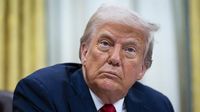In a bold move that has reverberated around the globe, U.S. President Donald Trump has announced new tariffs targeting ten countries, including Australia. This decision, described by Trump as a "historic" executive order, was unveiled during an event dubbed "Liberation Day." The tariffs, which impose a 25% duty on foreign cars, are part of a broader strategy to reshape international trade relations.
Australia, in particular, has been caught in the crossfire of this trade war. The new tariffs will see a 10% levy on Australian exports to the United States, the lowest rate among the affected nations. However, this has not deterred Trump from criticizing Canberra's trade policies, particularly regarding the importation of Australian meat. In a retaliatory stance, Trump has vowed to ban Australian meat imports, responding to Australia's restrictions on American beef.
As the trade tensions escalate, the implications of these tariffs are being felt far and wide. In a striking example of the absurdity of the current trade climate, Trump's tariff list even includes two uninhabited islands—Heard Island and McDonald Islands—located near Antarctica. These islands, home to a population of seals and penguins, have not seen human visitors in nearly a decade. Yet, they are now subject to a 10% tariff, further illustrating the lengths to which Trump's administration is willing to go in its trade war.
Australian Prime Minister Anthony Albanese reacted to the news with a mix of disbelief and frustration, tweeting, "There is no safe place on Earth." His comments highlight the bizarre situation where even remote territories are not exempt from the fallout of international trade disputes. While these islands are officially part of Australia and lack self-governance, they maintain a unique relationship with the federal government.
Adding to the complexity of the situation, Norfolk Island, another Australian territory, has been slapped with a staggering 29% tariff, significantly higher than the rate imposed on the mainland. This raises eyebrows, especially since local officials pointed out that Norfolk Island does not export goods to the U.S. and faces no trade barriers for incoming products.
In a statement to The Guardian, a local official expressed confusion over the situation, stating, "I'm not sure that Norfolk Island, with all due respect, competes with the giant U.S. economy, but this illustrates the reality that no place on Earth is safe from this." This sentiment encapsulates the growing concern among Australian officials regarding the unpredictable nature of Trump's trade policies.
The new tariffs and the accompanying rhetoric have sparked outrage not only in Australia but across the globe. Critics argue that such measures could lead to a broader economic fallout, affecting industries and consumers alike. The automotive sector, in particular, is bracing for the impact of the 25% tariffs on foreign cars, which could drive up prices and limit choices for American consumers.
As the dust settles from this latest announcement, it remains to be seen how countries will respond. Australia has already indicated its intent to retaliate against the U.S. tariffs, signaling a potential escalation in the trade war. The stakes are high, and the global economy is watching closely as the situation unfolds.
In the meantime, businesses on both sides of the Pacific are left to navigate this uncertain landscape. For Australian exporters, the 10% tariff represents a significant hurdle, while American consumers may soon feel the pinch as prices rise on imported goods. The interconnected nature of the global economy means that the repercussions of these tariffs will likely extend far beyond the initial targets.
As tensions simmer, the international community is left to ponder the implications of Trump's aggressive trade policies. Will this lead to a more protectionist world, or will it ultimately encourage countries to seek more cooperative trade agreements? Only time will tell, but one thing is clear: the trade war is far from over, and its effects will be felt for years to come.





